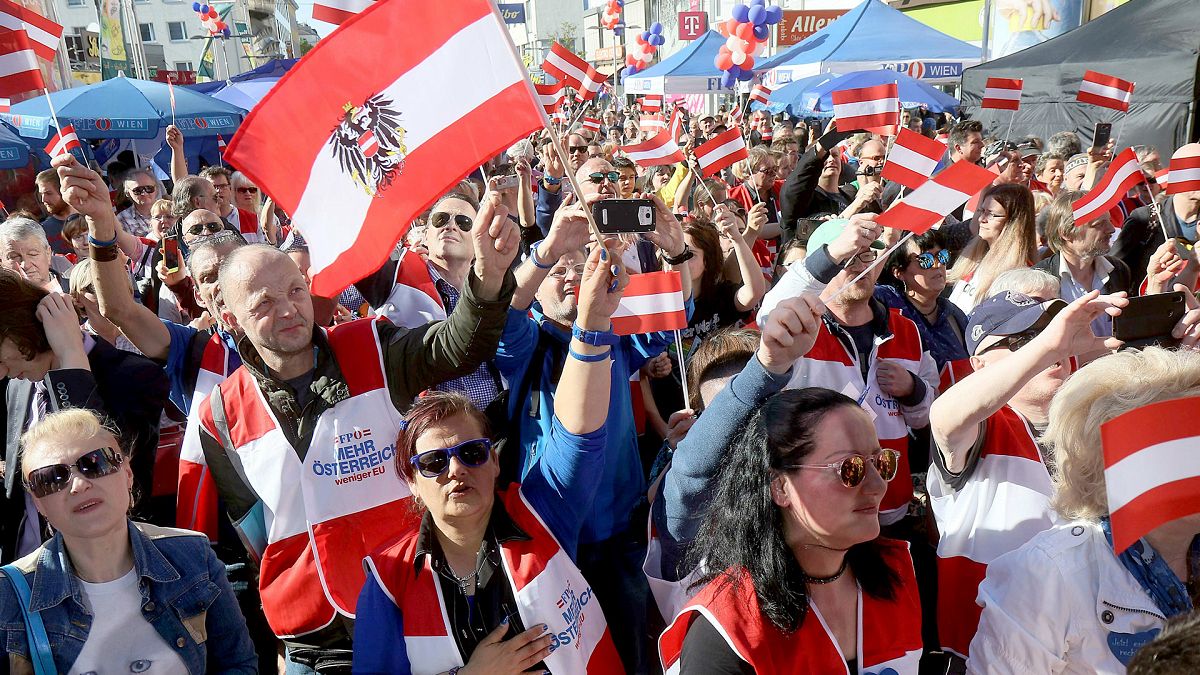The anti-immigrant Freedom Party (FPÖ) is leading in the polls — although it’s unlikely to secure an absolute majority.
Austrians will vote on Sunday in parliamentary elections, which polls suggest could be narrowly won by the country’s far-right Freedom Party (FPÖ) for the first time in the party’s history.
The FPÖ, one of Europe’s oldest far-right parties, is leading in polls with 28% of the vote, according to a survey carried out in early September by the Market-Lazarsfeld Institute.
Even if the party were to win its predicted share, it is unlikely it would be able to form a majority.
Finding a coalition partner with which to form a government might also be a challenge as several other parties, including the ruling conservative Austrian People’s Party (ÖVP), have ruled entering a coalition as a junior partner with them.
Nevertheless, if the FPÖ were to make it into power as a lead coalition partner, Austria would join several other European countries where the government is pushing further to the right after gaining support on an anti-immigration and broadly Eurosceptic platform.
How far-right is the FPÖ?
The FPÖ and its leader Herbert Kickl’s manifesto is anti-immigrant, decisively Eurosceptic and proposes a ban on what it describes as “political Islam”.
Its programme plans to cut provisions for asylum seekers and irregular migrants, as well as block family reunification visas in Austria.
It has also touted a commitment to “remigration” — a vaguely worded strategy of returning people to their country of origin, potentially including people born in Austria.
It has also said it is opposed to EU sanctions against Russia and providing Ukraine with further aid.
“With Kickl, the party entered the territory of the extreme-right, which is a badge he wears with pride,” Valentina Ausserladscheider, assistant professor of economic sociology at the University of Vienna, told Euronews.
“He calls himself the ‘Volkskanzler’, or chancellor for the people, which is a problematic concept because of its link to the historical legacy of the Third Reich.”
For others, however, Kickl’s charisma has allowed him to tap into Austrians’ concerns in a way that leaders of other parties have not.
“Kickl can be reflective, and in some ways is a better communicator than the other leaders of Austrian parties,” Heinisch Reinhard, professor of comparative Austrian politics at the University of Salzburg, said.
The FPÖ are not strangers to the Austrian public, having twice been the junior partner in governing coalitions.
“Not too long ago they were in a coalition with the leading conservative party, who already moved the country to the right on points such as integration and EU scepticism,” Reinhard said.
“Ideologically, the FPÖ are not particularly dogmatic, apart from their stance on immigration, but tend to successfully incorporate grievances that Austrians have. They tend to look towards Viktor Orbán and Hungary’s model.”
What are Austrians concerned about?
The cost of living and immigration are the two main concerns facing Austrians, according to a survey conducted by the European Commission in autumn 2023.
The country has traditionally adopted a hard-line stance on migration, with tougher immigration rules featured in the manifestos of the three parties polling the highest in the run-up to the election.
The far right has blamed migration and the war in Ukraine for Austria’s high inflation rate, which has been stuck above the EU’s average for almost two years as growth has been sluggish.
“The FPÖ has successfully managed to blame the government for the way it has dealt with key issues,” Ausserladscheider said.
“It has been able to take these more geopolitical problems and break them down in a way that suggests it’s something that hurts the Austrian people, which had worked when you did see energy prices rising, and the pressure of inflation hitting people.”
The party has drawn on the outcome of the COVID-19 pandemic, sharply criticising Austria’s incumbent ruling coalition for the way it handled the latter portion of the pandemic, framing it as an unacceptable curtailing of citizen freedoms and stoking conspiracy theories about the effectiveness of Austria’s vaccination campaign.
What happens next?
The party has found difficulty retaining allies in Austrian politics, with the ÖVP publicly ruling out the possibility it would enter a coalition with the FPÖ as a junior partner.
The ÖVP, the centre-left Social Democratic Party (SPÖ), and the Green and liberal political party NEOS may, however, decide to work with the FPÖ, depending on the election result.
“We have seen on a regional level, party’s say they will not work with the FPÖ before the election, but end up doing so,” Ausserladscheider said.
After polls close at 5 pm Sunday and the final votes are counted, the largest party in the new parliament is traditionally asked to form a government. Coalition negotiations could potentially stretch over months.
If the FPÖ manages to form a coalition, it would join several other far-right parties in power across Europe.
“It’s potentially problematic for the European Union project because the more nationalist, anti-European parties are in governments, the less likely it is the European project will survive, and the Union will be less integrated on specific measures.”

